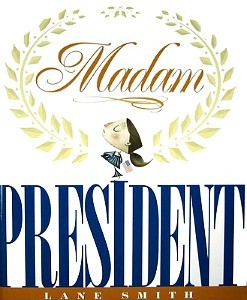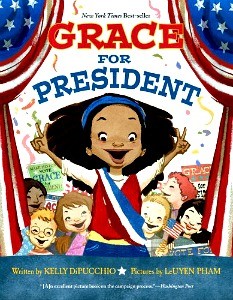
The Horn Book website has lots of material of interest to teachers. Here are some areas to explore. And follow us on Twitter: #lollysclass
|
Interviews with authors and illustrators Recommended books -- reviews and themed book lists |
School -- reading in school, author visits, and more Suggestion box: what else to you want to see in Lolly's Classroom? |
Women can be president, too!
With the 2016 presidential election just a few months away, news from the campaign trail continues to dominate the headlines.
In my second grade classroom, I actively tried to challenge my students’ thinking about stereotypes. Each year, I used a book called Grace for President to open a discussion about the job of president and the fact that the United States has never had a female in the Oval Office. Each year I was surprised to learn that while my students knew that a person of any race could hold the office of president, at least three or four students thought that women were not allowed to be president.
The prominence of women in the current political climate offers a chance to actively counter messages that our students may be receiving about who can run for — and possibly win — the presidency. By using children’s literature and then tapping into the current headlines, we can build real-world connections using books such as those mentioned below to broaden student understanding and counter possible misconceptions.
 Madame President written and illustrated by Lane Smith
Madame President written and illustrated by Lane SmithIn the style typical of Lane Smith, Madame President takes a humorous look at the duties and responsibilities that a president must perform. As the female main character imagines herself fulfilling the role of president, students will learn about some of the many facets of the job of president, which can spur discussion about what type of qualities an effective president should have.
 Grace for President by Kelly S. DiPucchio, illustrated by LeUyen Pham
Grace for President by Kelly S. DiPucchio, illustrated by LeUyen PhamAfter her teacher shares a poster of all of the presidents, Grace demands to know, “Where are all the girls?” Her question leads her teacher to create a mock-election in which Grace, of course, participates. The book provides an engaging introduction to how the electoral college works, but it is the gender dynamics at play throughout the book, including questions about whether Grace can win the votes of boys in the school, that will spark follow-up discussions about gender and leadership.
 A Woman for President: The Story of Victoria Woodhull by Kathleen Krull, illustrated by Jane Dyer
A Woman for President: The Story of Victoria Woodhull by Kathleen Krull, illustrated by Jane DyerIn this biography, Krull chronicles the life of Victoria Woodhull, who in 1872 became the first woman to run for president. In A Woman for President, we learn of many “firsts” that Woodhull achieved, including giving a speech in Congress. In addition to discussing Woodhull’s campaign, the story also opens the door for a conversation about women’s rights and the 19th amendment, as Woodhull campaigned for president before women were permitted to vote.
As election season draws ever-closer, we can cultivate engaged young citizens by allowing current events to enter the classroom and form the basis for important conversations about equality and representation in the United States.
RELATED
RECOMMENDED
ALREADY A SUBSCRIBER? LOG IN
We are currently offering this content for free. Sign up now to activate your personal profile, where you can save articles for future viewing.







Add Comment :-
Be the first reader to comment.
Comment Policy:
Comment should not be empty !!!